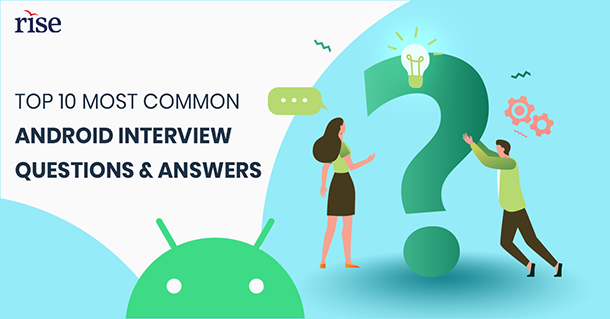

The shift towards “digital everything” is only getting stronger. The already booming app development market is only further set to grow! Research by buildfire suggests that there are 2.8 million apps on Google PlayStore and the number is only going to soar. Users want to engage and explore the internet even more on their handheld devices. And we certainly see no sign of a slowdown in the foreseeable future.
Are you ready to jump aboard the Android app development bandwagon but have questions left answered? Fret not. We will help you overcome this feeling of being overwhelmed through this article. We want you to navigate common Android interview questions successfully. So, here they are. Let’s dive right in!
Qn. 1) Explain the characteristics of Android
| Criteria | Characteristics |
| Type of Operating System | Open Source |
| OC Fragmentation | Multiple OS versions & interoperability concerns |
| Customization | Heightened Customization Possible |
Qn. 2) What is Android SDK?
Developing a mobile application requires some tools. This requirement is fulfilled by “Android SDK” – a set of tools for writing or developing apps. The Graphical User Interface emulates the Android environment. It acts like an actual device that developers use for writing their code. Further, a test or debug identifies if the same code has any issues.
Qn. 3) Why Can’t You Run the Standard Java Bytecode on Android?
Android uses Dalvik virtual machine (DVM) with the help of a special bytecode. You need to first convert Java class files into Dalvik executable files with ‘dx’, an Android tool. Developers don’t use this tool directly. Instead, build tools to handle the generation of DVM compatible files.
Qn. 4) Briefly List the Components of the Android Architecture
The Android stack typically has five main components. Here’s a brief description of the same.
Qn. 5) What is DDMS and what does it do
DDMS stands for Dalvik Debug Monitor Server. It ships natively with Android and has many useful debugging features. It includes location data spoofing, network traffic tracking, port-forwarding, incoming call/SMS spoofing, screen capture, thread and heap information and the ability to simulate network state, speed and latency.
Qn. 6) What are the seven lifecycle methods of Android activity and what is their purpose?
The methods include onCreate(), onStart(), onRestart(), onResume(), onPause(), onStop() and onDestroy(). It structures the code around an activity to be performed throughout its lifecycle on the device. For instance, onCreate() allows you to perform your static setup, right from creating views to binding data to lists. OnStart() is the next step where the app becomes visible to the user. You need a response with a solid grasp of the Android app lifecycle.
Qn. 7) What made you become an Android developer? What are some of the major advantages of the Android platform?
Here are the key advantages of being an Android developer:
Qn. 8) Write a quick script for launching a new activity within your application.
This question intends to test your knowledge of explicit intent in launching an activity. An explicit intent clearly defines the developer’s activity. A possible solution is as follows.
1.Intent myIntent = new Intent(this, MyNewActivity.class);
2.startActivity(myIntent);
Qn. 9) What is meant by services?
Service is an Android component that acts independently and runs in the background. It does not provide any user interface. While the services run behind the scenes, a user can continue working on different apps. Mostly, users are not aware of the services that run in the background.
Qn. 10) What is the importance of setting up permission in app development?
Once the app development permissions are set up, the data and code are restricted only for authorized users. Suppose the code has no restrictions or is accessible to anyone. In that case, there are higher chances of compromising code, which can lead to defect leakage.
Where to Go from Here?
In the above list of top android interview questions and answers, we’ve taken you through topics that you would undoubtedly encounter during an interview, regardless of your level.
Whether you apply for a beginner or an advanced role, getting up to speed on these topics will give you all the motivation needed to ace an interview. But before you jump on the Android bandwagon, make sure you have the technical know-how to stay ahead of the competition. Our Android Mobile Development Training program empowers you with the right skills to make it big in this lucrative market. Come explore our curriculum.
We use cookies to deliver the best browsing experience as well as for analytics and marketing purposes. By continuing to browse this website, you accept the use of cookies. For more information, please visit our Privacy Policy